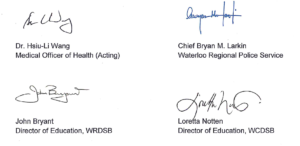December 22nd, 2017
Dear Parents and Caregivers,
Once again, we are sending families important information about opioid-related drug overdoses and urging you to speak with your children about staying safe.
On December 2, 2017, Waterloo Regional Police Services reported that 65 people in our region died as a result of a suspected overdose. This is a 71 per cent increase from 2016. The drug fentanyl is to blame in many of these overdoses. Fentanyl is a very potent drug that people may take on purpose; however more and more there are reports of fentanyl being added to other substances. Fentanyl has been found in drugs that you swallow, smoke and inject.
Overdose can happen to anyone’s family. As we approach the holiday season, please make time to have conversations with your children about how they can stay safe. As caregivers, there is a lot you can do to help your children understand the risks of drug use. Having open and supportive conversations about substance use and overdose is an approach we know works well for young people.
- Talk to your children about real versus fake medications. It is often impossible to tell the difference between a prescription pill and a fake pill made illegally on the street. You can’t see, smell or taste fentanyl.
- Talk about how opioids can be mixed in with other drugs on purpose or by accident and that there is a risk of opioid overdose even if they are not using an opioid (for example fentanyl).
- Talk about the danger of combining drugs with alcohol, which increases risk of an overdose.
- Talk to your child about what an overdose looks like and what to do if they see someone who may need help. Make a safety plan with your child if they are out with their friends. Let them know that it is always safe to call you if they are concerned about their own or a friend’s wellbeing.
- Tell your child to call 911 if they believe someone is overdosing. The Good Samaritan Act means they will not be charged with drug possession. Many youth are afraid to call 911 for fear that the police will charge them or that they will be in trouble with their parents. Let them know that their safety and their friends’ safety is what matters most.
If you or someone you love uses a prescription opioid, or may be at risk of an overdose because they use drugs, you can get a free Naloxone kit. Naloxone is medicine that will reverse an opioid overdose for a short period of time until an ambulance can arrive to help. It saves lives.
Remember, young people are experimental. It is important to return your old or unused prescription medications – youth often get drugs from home or from their friends’ homes.
The following videos and resources provide more information about drug use among youth and can help you talk with your children about the signs of an overdose, fentanyl, naloxone and calling 911.
- #thenewFword’ – Waterloo Regional Police Services Video
- Naloxone administration and the signs and symptoms of overdose
- 2017 Ontario Student Drugs Use & Health Survey Study – highlights
Many organizations in Waterloo Region work in partnership to address overdose, opioid use and substance issues. To find out more about the Waterloo Region Integrated Drug Strategy, visit the website at www.waterlooregiondrugstrategy.ca.
Thank you for taking the time to read this letter and have a safe and healthy holiday season.
Sincerely,

Categories: Home Page
